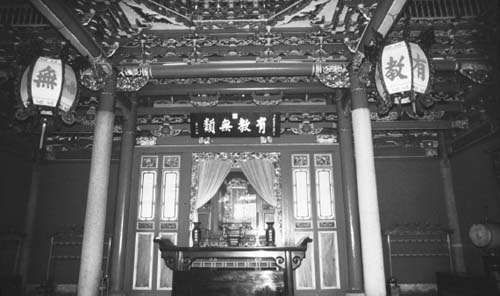Confucianism, the Literati, and Chinese Imperial TraditionsHistory and Sources |
What were the earliest Confucian sacred texts? |
A set of works called the Five Classics (Wu Jing) became a formal collection sometime during the Han dynasty (202 B.C.E.-220 C.E.). The Yi Jing, or Classic of Change, is a manual of divination dating from the early Zhou dynasty (c. 1030-256 B.C.E.). Based on the sixty-four hexagrams formed by combinations of the eight trigrams (described on page 323 in the chapter on Daoism), the Yi Jing assists practitioners in the interpretation of fundamental life choices. Although it was originally designed as a descriptive device, popular usage over the centuries has bestowed on the book powers of prognostication. The Classic of History (Shu Jing) assembles historical documents from as early as 600 B.C.E. to as late as 200 C.E. The Classic of Poetry (Shi Jing) is an anthology of over three hundred poems, some from as early as 800 to 600 B.C.E. Ancient tradition that Confucius himself had compiled the material from a larger collection of over three thousand pieces is probably inaccurate. But it does appear that Confucius and his disciples used the poems as sources of ethical example. Completed around 100 C.E. of material from much earlier times, the Classic of Rites (Li Ji) preserves ceremonial records that offer essential insights into ritual life. Along with the Ceremonial and Ritual (or Yi Li) and the Officials of the Zhou [dynasty] (or Zhou Li), it eventually became one of three texts on “rites” known collectively as the Li Ching. Finally, the Annals of Spring and Autumn (Chun Qiu) chronicles events in Confucius’ home province of Lu from 722—181 B.C.E. (called the Period of Spring and Autumn), and the tradition that Confucius edited the text seems to be accurate. Confucius may also have authored part of an extensive commentary on the Yi Jing. A now lost Classic of Music (Yue Jing) would have constituted the sixth “Classic.” Confucius probably did not edit the last four classics as ancient tradition claims, though he certainly knew the material intimately.

Inside the main memorial hall of Taipei Confucius temple is the central altar dedicated to Confucius himself, with his spirit tablet behind the table holding ritual vessels and beyond the curtained arch.
